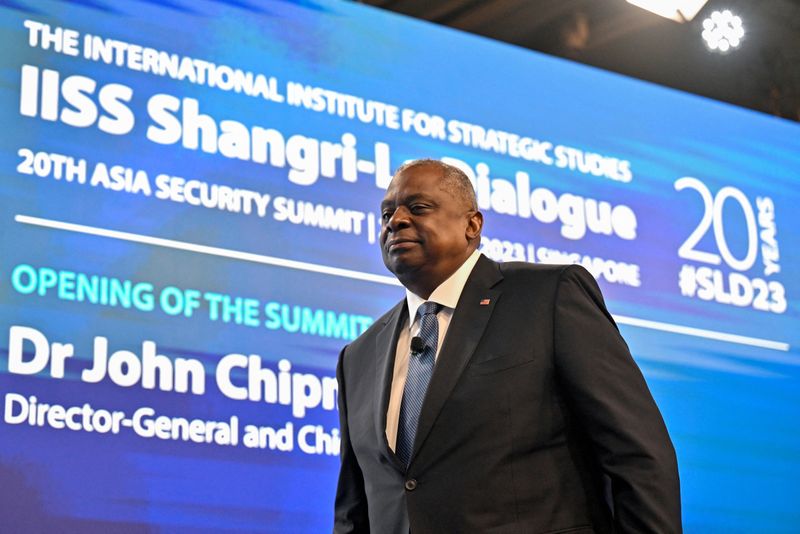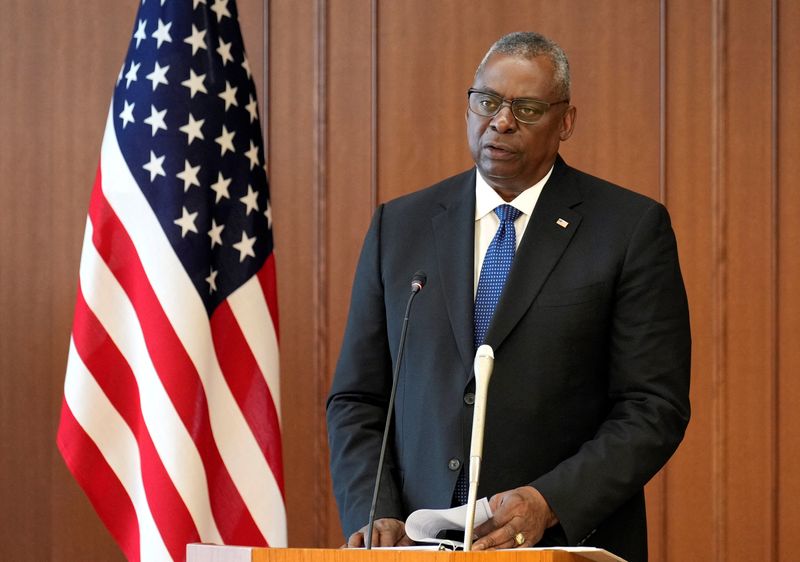By Chen Lin and Xinghui Kok
SINGAPORE (Reuters) -U.S. Secretary of Defense Lloyd Austin rebuked China on Saturday for refusing to hold military talks, leaving the superpowers deadlocked over Taiwan and territorial disputes in the South China Sea.
Speaking at the Shangri-La Dialogue, Asia's top security summit, Austin said Beijing's reluctance to talk undermined efforts to maintain peace in a region where the two rivals are increasing their military firepower.
"I am deeply concerned that the PRC (People's Republic of China) has been unwilling to engage more seriously on better mechanisms for crisis management between our two militaries," Austin told the meeting in Singapore.
"The more that we talk, the more that we can avoid the misunderstandings and miscalculations that could lead to crisis or conflict."
A senior Chinese military official struck back, saying the United States was responsible for a breakdown in dialogue by ramping up sanctions on Chinese officials and destabilising the Asia-Pacific with its military presence.
"China-U.S. military relations are faced with difficulties and the responsibility lies entirely on the U.S. side," Lieutenant General Jing Jianfeng told reporters at the summit.
"China attaches importance to developing China-U.S. military relations, and our interactions and communication have never been suspended."
A U.S. and a Canadian warship sailed through the Taiwan Strait on Saturday, the U.S. Navy said, a show of military might that has incensed China in the past and is likely to push the two sides further apart.
There had been slim hopes that the annual Shangri-La Dialogue would be an opportunity to mend the relationship between the U.S. and China, which is at its lowest point in decades.
Washington and Beijing are at loggerheads over everything from the future of democratically ruled Taiwan, territorial claims in the South China Sea and President Joe Biden's restrictions on semiconductor chip exports.
TAIWAN IMPASSE
China's Minister of National Defence Li Shangfu had this week declined an invitation to meet Austin at the security summit. Li, a general who has been sanctioned by the U.S., delivers his own speech on Sunday.
On Friday, the two shook hands on the sidelines of the conference but did not hold detailed talks, the Pentagon said.
"A cordial handshake over dinner is no substitute for a substantive engagement," Austin said.
Dialogue between the two countries has stalled since U.S. Secretary of State Antony Blinken cancelled a visit to China in February after a suspected Chinese spy balloon was tracked flying across the United States.
One of the thorniest security issues between the two superpowers is over the future of Taiwan, which Beijing wants to bring under its rule.
There are increasing concerns that China could invade Taiwan with the U.S. drawn into any conflict.
Austin pointed to Russia's invasion of Ukraine as an example of "how dangerous our world would become if big countries could just invade their peaceful neighbours with impunity".
He said the U.S. was "deeply committed" to preserving the status quo in Taiwan and opposes unilateral changes from either side.
"Conflict is neither imminent nor inevitable. Deterrence is strong today and it’s our job to keep it that way," Austin said.

General Jing said Austin's comments were misleading, accusing Washington stoking tensions by forging direct diplomatic relationships with Taiwan and increasing arms sales to the territory.
"The U.S. uses Taiwan to contain China and the Taiwan separatist forces solicit U.S. support to push for independence," Jing told reporters.
